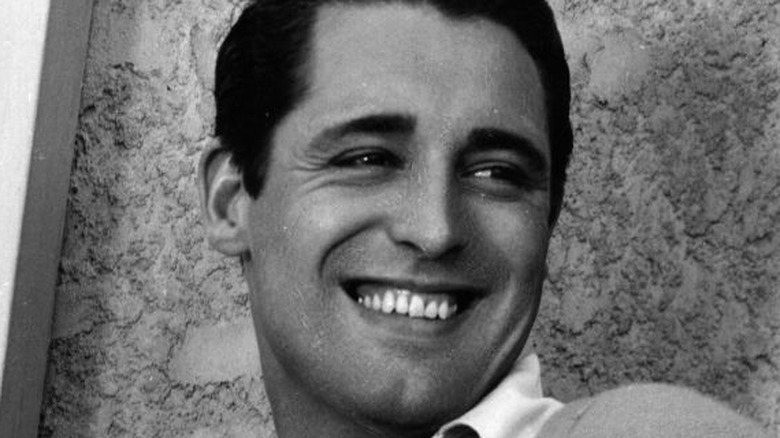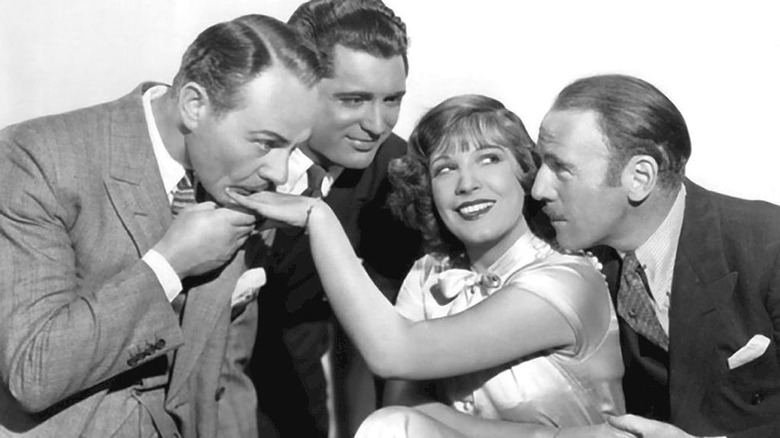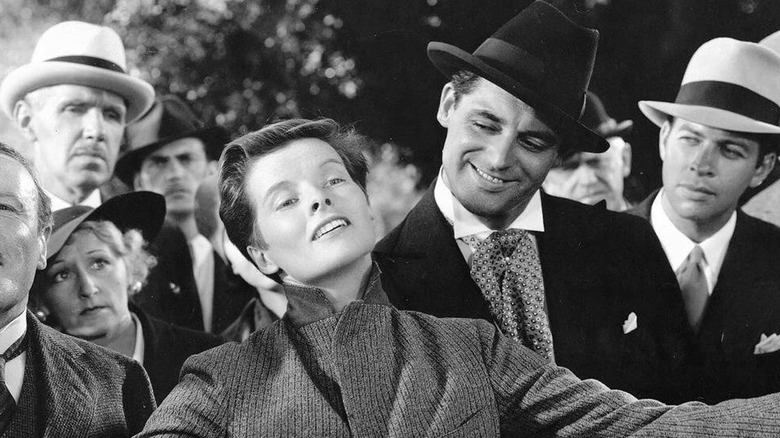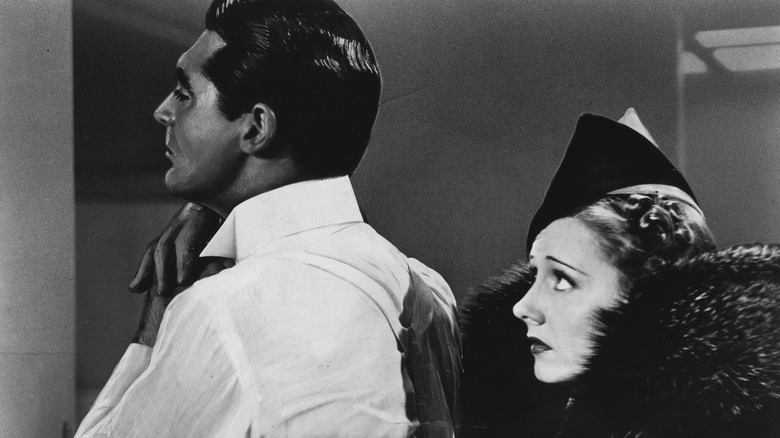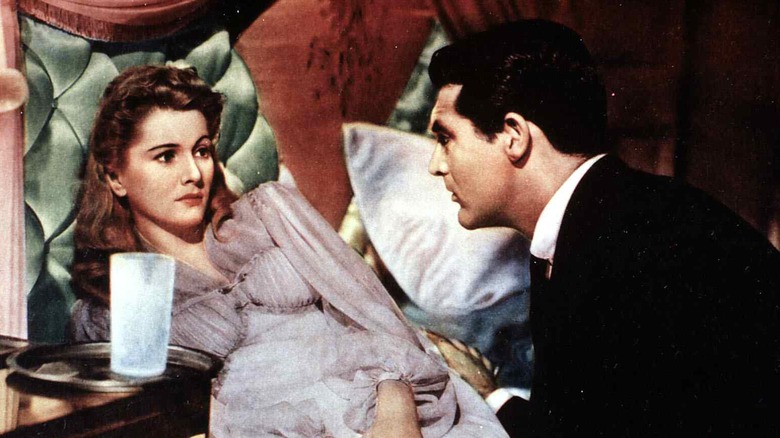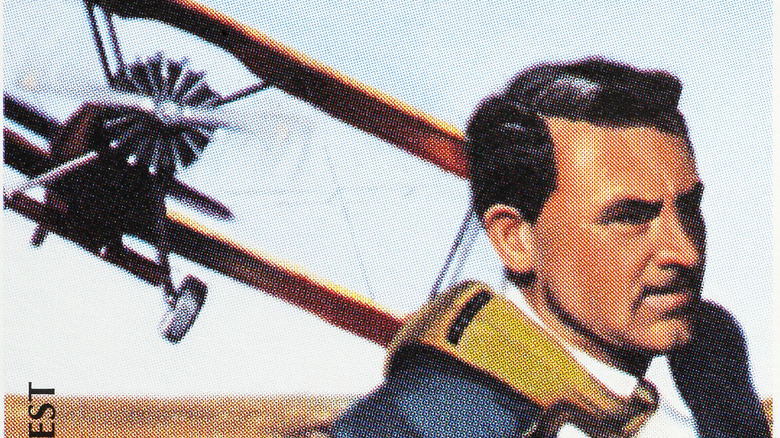These Cary Grant Movies Have Been Described As A Beginner's Guide To His Work
You can't bring up Jimmy Stewart, Audrey Hepburn, or any other esteemed actor of Hollywood's Golden Age without mentioning Cary Grant. For 34 years, Grant carved his name into big screens across the world and remains a staple in movie history. Just before his death, the mighty Alfred Hitchcock once said (via Cary Comes Home): 'Knowing Cary is the greatest association I've had with any film actor. Cary is the only actor I ever loved in my whole life."
Born in Bristol, England, in 1904, Grant came from humble roots. Hardship was woven into the fold of his upbringing, his father being an alcoholic and his mother enduring manic depression throughout his early life. At the age of 13, he ran away from home to perform as a juggler with a comedy troupe. It was in 1932 that he made his cinematic debut in "This Is the Night" shortly after signing with Paramount Pictures, and a multitude of movies followed that enthroned him as one of the greatest actors of all time (per Biography).
If you're looking to become a little more acquainted with the man whom Roger Ebert once called "the most charming man in the history of the movies," take a peek at the list of titles below for a good place to start.
This Is the Night (Frank Tuttle, 1932)
Despite the fact that Cary Grant hated his supporting role as Stephen Mathewson so much that he threatened to leave Hollywood after "This Is the Night" came out, critics caught on to his prowess and potential and were hungry to see more from him. It was his first-ever role in a movie, so the bitter impression was indeed a powerful one, but not so much that it deterred him from returning to the screen (via Far Out Magazine).
"This Is the Night" tells the story of Gerald (Roland Young) and Claire (Thelma Todd), two lovers whose affair is discovered by Stephen (Cary Grant), Claire's husband and an Olympic javelin thrower. Stephen embarks upon a quirky quest to unveil the truth that his unfaithful wife and her not-so-secret lover are hiding. After Gerald hires Germaine (Lili Damita) — a young Parisian woman desperate for work — to pose as his wife in an attempt to thwart suspicions from Claire's husband, he starts falling for her unexpectedly. "This Is the Night" is a light-hearted comedy that toys with romance and jealousy in a slapstick, charming manner, and whether he liked it or not, the film was pivotal for Cary Grant and the momentous career he would go on to construct.
Sylvia Scarlett (George Cukor, 1936)
The brief slew of years that followed "This Is the Night" were more or less discouraging to the young and emerging Cary Grant, with financial failures like "Born to Be Bad" (1934), Kiss and Make-Up (1934), and Wings in the Dark (1935) further besmirching his already jaded outlook on the world of movies. However, when RKO Pictures decided to throw him up on the big screen next to the legendary and unabated Katharine Hepburn in "Sylvia Scarlett," things finally started to take a positive turn (via Far Out Magazine).
Cary Grant plays Jimmy Monkley in the film, a Cockney confidence man who discovers the unsavory secret of one Henry Scarlett (Edmund Gwenn). After the death of his wife, Henry and his daughter Sylvia (Katherine Hepburn) flee to England to escape their debts and illegally smuggle some French diamonds into the country along the way. After learning of their secret, Monkley promptly reports their insubordination to authorities to subvert detection of his own crime (he is also smuggling diamonds). When they arrive in England, the three take on several unsuccessful con jobs together, and in an effort to protect her father from authorities and slimy criminals like Monkley, Sylvia starts disguising herself as a man and changes her name to "Sylvester" to follow him around in secret. While the film didn't exactly perform financially well, Grant's performance was widely revered by critics, and his career gained some much-needed traction (via Far Out Magazine).
The Awful Truth (Leo McCarey, 1937)
"Big Brown Eyes" (1936), "Topper" (1937), and "The Toast of New York" (1937) earned Cary Grant additional critical acclaim following the momentous impact of his role in "Sylvia Scarlett." "The Awful Truth" almost seemed to be personally crafted for him, calling forth his augmented abilities in vaudeville antics and the exhibitionist tricks he learned while working with the comedy troupe. As the film's lead character, he proved to the world at large that he was able to balance sophistication with comedy in an astoundingly versatile way (via Far Out Magazine).
Leo McCarey's Oscar-winning screwball comedy tells the story of Jerry (Cary Grant) and Lucy (Irene Dunne), a couple that resolves to get divorced after infidelity on both their parts prompts them to do so. However, as they watch one another move on from their failed and exhausted marriage, they slowly start to realize that they may have taken each other for granted. Jealousy and regret inspire Jerry to start meddling in Lucy's new relationship with an Oklahoma businessman (Ralph Bellamy), and Lucy longs for her ex-husband and the only dance partner who could ever follow her lead. "The Awful Truth" was nominated for six Academy Awards at the 1938 Oscars ceremony, and Leo McCarey took home the award for best director (via IMDb).
Suspicion (Alfred Hitchcock, 1941)
By the time the 1940s rolled around, the fabled team-up between Cary Grant and Alfred Hitchcock was fast on the horizon. Hitchcock commissioned Grant during the height of his momentous success to star in his 1941 mystery/thriller "Suspicion," one of four films the two would make together (via Britannica). The film marked new territory for the ever-expanding acting capabilities of Cary Grant, exemplifying his disposition for darker, more sinister roles.
In the movie, Grant plays the charming and deceptive Johnnie Aysgarth, who tactfully seduces and marries Lina McLaidlaw (Joan Fontaine), an impressionable and lovestruck young woman born of significant wealth. Shortly after running away together, Linda starts suspecting her new husband of malicious foul play when Beaky, his close business partner, dies under mysterious circumstances. Being heir to a handsome inheritance, Linda wonders whether or not Johnnie is truly capable of murder for financial gain, and if so, will she be next?
North by Northwest (Alfred Hitchcock, 1959)
Just shy of two decades after "Suspicion" hit screens, Cary Grant contributed his fourth and final installment to the Alfred Hitchcock anthology. Most critics and moviegoers alike are in unanimous agreement that "North by Northwest" is without a doubt the actor's most prolific and career-defining performance. Hitchcock, Grant, and the film's entire production team traveled beyond contrived Hollywood movie sets to capture riveting scenarios filmed at Mount Rushmore, the United Nations, and a barren Indiana prairie where the iconic "plane chase" scene was filmed (per Variety).
After being mistaken for a government agent, Roger O. Thornhill (Cary Grant) is pursued cross-country by Phillip Vandamm (James Mason) — a cutthroat and ruthless spy — along with his team of cronies. The film is the perfect concoction of suspense, action, and thought-provoking mystery that makes the ominous Alfred Hitchcock legacy what it is, so if you're seeking the perfect place to start you Cary Grant odyssey, look no further than "North by Northwest."
